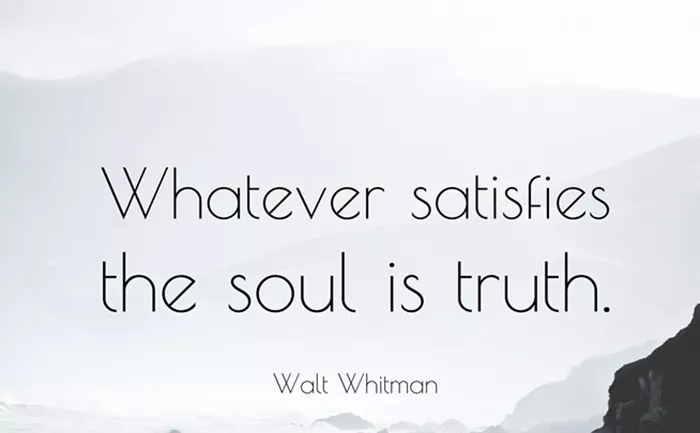Welcome to Poem of the Day – All Is Truth by Walt Whitman.
Walt Whitman, one of America’s most celebrated poets, is known for his profound and often revolutionary poetry. In his poem “All Is Truth,” Whitman presents a powerful exploration of reality, knowledge, and the human experience. The poem is brief but packed with meaning, inviting readers to contemplate the nature of truth and the role it plays in our lives. In this article, we will break down “All Is Truth,” examining its central themes, imagery, and significance to better understand Whitman’s vision.
All Is Truth Explanation
The Structure and Tone of the Poem
“All Is Truth” is a short, reflective poem that consists of just a few lines. Its simplicity in structure mirrors its deep philosophical inquiry. Whitman often used free verse in his poetry, and this poem is no exception. The lack of rigid form allows for a more fluid expression of the speaker’s thoughts and emotions.
The tone of the poem is declarative and confident, as the speaker is certain of the idea he is conveying—that truth, in all its forms, is essential and undeniable. Whitman’s use of direct language makes his message clear and approachable for readers of all backgrounds.
The Meaning of “All Is Truth”
At the heart of the poem lies a straightforward, yet profound statement: “All is truth.” This simple declaration suggests that truth exists everywhere in the world, in all experiences, ideas, and perspectives. For Whitman, truth is not confined to a single definition or a particular realm of understanding. Instead, it permeates every aspect of life, whether it is seen through the lens of nature, human relationships, or personal experiences.
Whitman believed that truth is multifaceted and complex. It can be found in both the grand and the minute, in moments of joy as well as in sorrow, and in the physical world as well as in the mind. His poetry often emphasizes this holistic view of truth, encouraging readers to find meaning in both the ordinary and extraordinary elements of life.
Truth in Nature and Humanity
Whitman frequently explored the connection between humans and the natural world, and “All Is Truth” is no exception. The idea of truth being inherent in nature reflects Whitman’s belief in the unity of all things. In nature, truth is not hidden but is instead visible in the cycles of growth, decay, and renewal. Whitman often saw nature as a mirror to human experience, suggesting that the truths of life could be found in the natural world around us.
In addition to nature, Whitman often associated truth with the human experience itself. He viewed individuals as essential components of the larger truth of life. His poetry speaks to the diversity of human experiences, recognizing that each person contributes a unique piece to the greater understanding of truth. In “All Is Truth,” Whitman may be suggesting that every human life is valid, every individual story is significant, and every experience contributes to the whole picture of truth.
The Role of Poetry in Conveying Truth
For Whitman, poetry was a means of revealing truth. He saw himself as a poet of the people, using his words to express universal truths that transcend time and place. In “All Is Truth,” the speaker’s declaration may also be an expression of Whitman’s belief in the power of poetry to uncover and reveal the deeper truths of existence. Through poetry, Whitman sought to express the inexpressible, to give voice to the truths that are often hidden beneath the surface of everyday life.
The poem’s simplicity, despite its weighty subject matter, reflects Whitman’s ability to distill complex concepts into accessible language. In this way, “All Is Truth” invites readers to engage with truth in a direct and personal way. The poem’s minimalism also echoes Whitman’s belief that the truth does not need to be complicated or abstract; it is, at its core, simple and available to all.
Conclusion
Walt Whitman’s “All Is Truth” is a powerful reminder that truth is not a singular, fixed concept but something that is all-encompassing and fluid. Whether seen in the natural world, the individual human experience, or the art of poetry itself, truth is present in everything. Through this poem, Whitman challenges us to embrace the multiplicity of truth and to recognize its presence in both the mundane and the extraordinary moments of our lives. By doing so, we may come closer to understanding the deeper forces that shape our world. In its simplicity and depth, “All Is Truth” captures the essence of Whitman’s poetic philosophy, reminding us that truth is something we must seek in all things, and that it is something that is always available to us—if only we open our eyes to see it.

